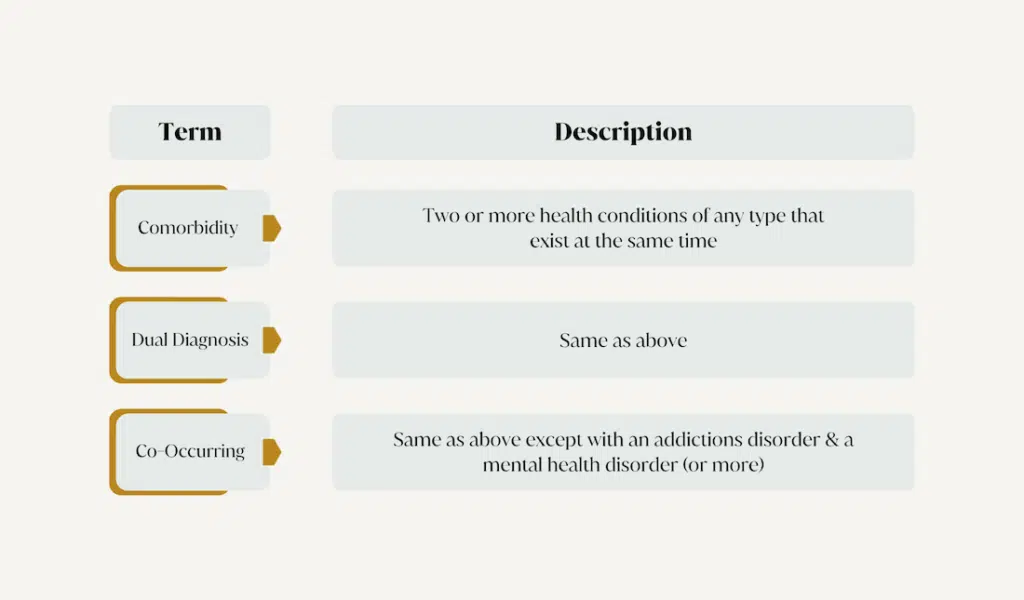If you’ve heard the terms co-occurring disorder and dual diagnosis it’s understandable to be confused about what they are and the differences between them. In this article I explain these important terms and how they relate to substance abuse.
What Are Co-Occurring Disorders?
Before clarifying what co-occurring disorder means, there are two terms which are also used and can be confusing: comorbidity and dual diagnosis. These are medical terms used to describe when any two or more health conditions of any type exist at the same time.
They may or may not interact with each other. There could be a heart condition and diabetes, for example, or two mental health conditions such as depression and anxiety, or several such as arthritis, a heart condition and bipolar disorder. Sometimes the term “dual diagnosis” is used when there are only two.
Co-occurring disorder is a subcategory of dual diagnosis. It is typically used in the mental health field when someone suffers from a substance use disorder but also has another mental health condition such as depression, or vice versa.

When Do Disorders Become Co-Occurring?
A disorder becomes co-occurring when someone has one mental health condition and then is diagnosed with one or more others. This term is primarily used by mental health professionals.
For example, someone may have a substance use disorder and then be diagnosed with obsessive compulsive disorder. Or this could be the other way around. It doesn’t matter what the sequence is, it becomes co-occurring once there are two or more diagnoses.
What is Dual-Diagnosis?
Dual diagnosis simply means when two diagnoses have been made at the same time. For example, this may be when someone addicted to drugs or alcohol is diagnosed with substance use disorder and is also diagnosed with a mental health condition such as anxiety. Or it may be the other way around where the mental health condition may be a contributing factor in developing an addiction and they are both diagnosed.
Dual Diagnosis vs Co-Occurring Disorders
Dual diagnosis is used interchangeably with co-occurring disorder. More specifically, dual diagnosis refers to two conditions occurring at the same time. While the term co-occurring generally means the same thing, it can also mean more than two diagnoses at the same time, for example, alcohol abuse, depression and liver disease.
This table summarizes these terms:
| Comorbidity | Two or more health conditions of any type that exist at the same time |
| Dual diagnosis | Same as above |
| Co-Occurring | Same as above except with an addictions disorder & a mental health disorder (or more) |
How Does Dual Diagnosis Work?
All co-occurring disorders can also be referred to as dual diagnosis. However, not all dual diagnoses will necessarily be classified as co-occurring disorders. This despite the fact that the two terms are often used interchangeably. One of the disorders will usually be termed the primary condition and the other the secondary.
Based on a clinical assessment, a diagnosis will be made of each condition and the interactions between them. Then a doctor and/or mental health professional will develop a treatment plan. This may involve appropriate medication for each disorder, therapy and other forms of rehabilitation treatment.
What To Expect From Dual Diagnosis
As with the chicken and egg, it can be hard to tell which comes first in dual diagnosis. Researchers believe there may be genetic and environmental risk factors such as family background at play. Even though they may occur together, it doesn’t mean one was the cause of the other.
Mental health disorders may not directly cause substance use disorders (or vice versa). However there’s a clear connection between them. The continued use of substances can heighten the risk of having a mental health disorder. And alcohol and drugs can worsen mental health symptoms.
Dual diagnosis itself is not a diagnosis. Your health providers will use assessment and screening tools to develop a clearer understanding of each. Treatment will be for both disorders and typically at the same time or as they decide, in conversation with you. However dual diagnosis treatment does require you to stop using substances right away. Medically-assisted detox is the recommended route to do this.
Bring Professional Help to Your Recovery Path
You may choose to enter a residential treatment center such as we have at The Encino Recovery & Detox Center. Trained staff are equipped to provide the detox and therapy support necessary for you to reach your treatment goals. Participating in residential care greatly enhances your success rate at avoiding relapses.
Typical therapy approaches include:
- Cognitive Behavioral Therapy (CBT)
- Dialectical Behavioral Therapy (DBT)
- Trauma-focused Cognitive Behavioral Therapy (TF-CBT)
- Acceptance and Commitment Therapy (ACT)
- 12-Step Program
- Somatic Experiencing and Body Work
- Mindfulness Meditation
- Exposure therapy
Safe Detox in Los Angeles
At the Encino Recovery and Detox Center in Los Angeles we don’t just treat addiction. We nurture the spirit, heal the mind and help you to regain your life. If you or a loved one is seeking a way out of substance abuse, private, confidential help is just a call away. Reach out to our Admissions team now.

Sources
[A] National Center for Complementary and Integrative Health. 2019. “Detoxes” and “Cleanses”: What You Need To Know.
[B] Detoxification and Substance Abuse Treatment [Internet]. 2006. Substance Abuse and Mental Health Services Administration (US). (Treatment Improvement Protocol (TIP) Series, No. 45.) 1 Overview, Essential Concepts, and Definitions in Detoxification.

















